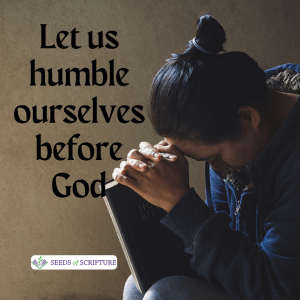Yom Kippur: A Powerful Call to Humility
Topics to Dig Into
 With eyeglasses askew, I lay face down in the mud, humbled, or rather humiliated in front of my confirmation students. In my imagination I zig-zagged with agility. When I stumbled, my ego was bruised far more than my body.
With eyeglasses askew, I lay face down in the mud, humbled, or rather humiliated in front of my confirmation students. In my imagination I zig-zagged with agility. When I stumbled, my ego was bruised far more than my body.
Unwittingly, I found myself in a biblical posture of humility—face down, surrendered before God’s greatness.
In the Bible, figures like Abram (Genesis 17:1-3), Moses (Numbers 20:6), and even Jesus fell prostrate in the presence of God (Matthew 26:39), instinctively recognizing their humble stature before the magnificent, powerful, and holy God.
Their physical surrender is a deeply reverent response, something our practices may have relaxed.
In my tradition, we close our eyes and bow our head. Most remove baseball caps and some fold their hands. Perhaps you slip from the pew onto a padded kneeler.
The Bible does not prescribe a proper prayer position. There’s no right or wrong. Prayer posture is a personal choice, an individual expression of reverence. God prefers sincerity over posture.
However, it seems as though biblical characters instinctively threw themselves to the ground in recognition of their status compared to God’s holiness. Do our modern gestures of reverence carry the same weight?
Have Christians forgotten the significant privilege and awe of standing in God’s presence?
Jews pray frequently, but the ancient Hebrews approached God only once a year on Yom Kippur. This Day of Atonement was, and still is the most holy day of the year.
The Ten Days of Awe between Rosh Hashanah and Yom Kippur allow time to repent of sin, restore relationships through forgiveness, and recommit to following God’s way. For ten days Jews contemplate the magnificent, powerful, merciful and holy Creator.
 On Yom Kippur, Jews approach God with deep humility seeking to reconcile their relationship with the Almighty. God prescribed this solemn ritual (full description in Leviticus 16) with tangible symbols of purity, humility, and contrition.
On Yom Kippur, Jews approach God with deep humility seeking to reconcile their relationship with the Almighty. God prescribed this solemn ritual (full description in Leviticus 16) with tangible symbols of purity, humility, and contrition.
Lawson Stone of the Seedbed.com community describes the need to completely surrender our human ego, writing:
The Old Testament sees human nature as power-hungry, heedless and grasping, always seeking to control, to dominate, even to oppress, and therefore in need of forceful restraint, of humbling and learning of lowliness. The Day of Atonement calls upon the worshiper to learn lowliness of soul, to rein in an out-of-control life, to deal the defiant, self-willed life of both body and spirit a crashing blow of self-renunciation.
Do Old Testament humans differ from us? Stone’s description seems to apply universally.
In a society that prioritizes self-esteem, independence, and personal power, it’s easy to forget the awe and surrender that characterized biblical worship.
A modern-day Yom Kippur ritual expresses humility in this prayer:
Once more Atonement Day has come. All pretense gone, naked heart revealed to the hiding self, we stand on holy ground… We tremble. At what did we aim? How did we stumble? What did we take? What did we give? To what were we blind?
Last year’s confession came easily to the lips. Will this year’s come from deeper than skin? Say then: why are our paths strewn with promises like leaves? Say then: when shall our lust be for wisdom? Say now: love and truth shall meet; justice and peace shall embrace.
O Hope of Israel: in our weakness, give us strength. In our blindness, be our guide. When we falter, hold our hand. Make consistent our impulse for good; let us know the joy of walking in your ways.
(from the Prayer Book for the Days of Awe)
In summary, this beautiful prayer says:
We failed to keep last year’s promises. When will we learn? Help us God!
The Jews acknowledge their shortcomings in this alphabetical list of offenses. I encourage you, since we tend to skim lists, to read slowly and consider each named sin. Or read the prayer multiple times:
We all have committed offenses; together we confess these human sins: The sins of arrogance, bigotry, and cynicism; of deceit and egotism, flattery and greed, injustice and jealousy. Some of us kept grudges, were lustful, malicious, or narrow-minded. Others were obstinate or possessive, quarrelsome, rancorous, or selfish. There was violence, weakness of will, xenophobia. We yielded to temptation and showed zeal for bad causes.
(from the Prayer Book for the Days of Awe)
Twenty-six categories of sin. Oh, so many reasons for humility before His Holiness. Through confession we grasp how desperately we need a Savior.
 The Day of Atonement prayer continues:
The Day of Atonement prayer continues:
What can we say before You, who dwell on high? What shall we plead before You, enthroned beyond the stars? Are not all things known to You, both the mysteries of eternity and the dark secrets of all that live? You search the inmost chambers of the heart and probe the deep recesses of the soul. Nothing is concealed from Your sight.
(from the Prayer Book for the Days of Awe)
Symbolically we fall with our face to the ground with respect due the Most High God. Exposed. Fully known. Yet, deeply loved by an infinite God.
Comprehending the magnitude of God’s grace yields humility and deep gratitude.
Praise God that Christians aren’t limited to an annual supervised visitation. We can approach God at any moment of every day.
Whether through physical posture or the posture of the heart, let’s reclaim a deeper sense of reverence before God and approach with the humility of those who came before us.
Dig in friends! Learn the meaning of Rosh Hashanah, then discover the symbolism in the ancient ritual of Yom Kippur. The Bible Project’s podcast on the Day of Atonement is enlightening, especially on The Bible Project mobile app. TBN’s series God’s Appointed Times with Rabbi Jason Sobel has been a helpful resource, as well as the Yom Kippur Diaries at Seedbed.com.
#SeedsofScripture #scripturestudy #YomKippur #RabbiJasonSobel #TheBibleProject #daysofawe #dayofatonement #humility #humbleyourself #humblesoul #repentance #prayer #RoshHashana #RoshHashanah #readthebiblebetter #biblestudy

Cathy, thank you for this informative article. I just finished reading the OT and had the same conclusion you gave- thankful we can approach God any minute of the day – not wait for an annual experience.
May we not become complacent about the privilege of approaching God knowing we have the blood of Christ covering our sins.
Thank you Cathy, it’s so easy to think “ I don’t really sin” then to be confronted with a list. Oh yes I do ! And also to know God has mercy on me and forgives me everyday.
It’s a sobering list, isn’t it? I’m not trying to make us feel bad about ourselves, but to highlight God’s grace and mercy.